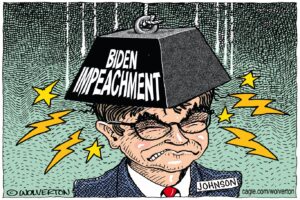Impeaching Alberto Gonzales
While politicians of both parties have repeatedly denounced Alberto Gonzales for public mendacity and abuse of office, a few of them finally have stepped up to do what must be done.While politicians of both parties have repeatedly denounced Alberto Gonzales for public mendacity and abuse of office, a few of them finally have stepped up to do what must be done. On July 31, Rep. Jay Inslee, D-Wash., and several colleagues — including four former prosecutors — filed a resolution directing the House Judiciary Committee to open an impeachment investigation of the attorney general.
The logic of Inslee’s initiative is inescapable to anyone who has been listening to the congressional complaints about Gonzales. If legislators from both branches and both parties believe that the attorney general has repeatedly deceived Congress and the public about matters of importance, if they believe that he has committed those deceptions under oath in the Capitol, and if they believe that the president will do nothing to remedy these wrongs, then impeachment is their only serious response.
So far, the Democratic leadership — and the Republicans who likewise suspect the attorney general of grave offenses — have carefully sidestepped this obligation. Instead they urge the appointment of a “special counsel” to probe the accusations of perjury against him.
For anyone who remembers the awful excesses of the Clinton impeachment and the punishment inflicted on the Republicans in the next election for their pernicious zealotry, such caution is understandable. But the burden of confronting the attorney general’s abuses cannot be shifted onto the White House. George W. Bush will take no action against his old pal “Fredo,” who retains his confidence (and who knows far too much about this president and this administration to be discarded anyway).
Despite Democratic reluctance, the prospect of a Gonzales impeachment has loomed for months and has only become more urgent with every prevarication he utters — and every new revelation of the partisan misuse of the Justice Department under his command. It is the culmination of a process that began with his confirmation hearings in January 2005.
That was when Sen. Russ Feingold asked whether Gonzales, the former White House counsel, agreed with a legal memorandum suggesting that the president can authorize unlawful acts by his subordinates (such as torture). “Does the president, in your opinion, have the authority, acting as commander in chief, to authorize warrantless searches of Americans’ homes and wiretaps of their conversations in violation of the criminal and foreign intelligence statutes of this country?” the Wisconsin Democrat inquired.
At first Gonzales declined to answer a “hypothetical.” But when pressed, he agreed that “the president is not above the law. … It is not the policy of this president to authorize actions that would be in contravention of our criminal statutes.” Then Feingold asked whether, as attorney general, Gonzales would “commit to notify Congress if the president makes this type of decision, and not wait two years until a memo is leaked about it.”
“I will advise the Congress as soon as I reasonably can, yes sir,” he replied, knowing that by then the White House had authorized wiretaps without warrants for three years. Eleven months later, that fact was disclosed on the front page of The New York Times, giving ample proof that Gonzales had lied to the Senate.
That probably wasn’t the first time and surely wasn’t the last. Since that defining moment, his credibility has sunk so low that he cannot appear on Capitol Hill without being called a liar to his face. The White House would like to pretend that this congressional fury is mere party politics, but honest Republicans, too, are rankled by the Gonzo spectacle.
Senate Republicans may or may not share Democratic suspicions over the strange firings of several United States attorneys; they may or may not worry that the attorney general has turned the Justice Department into an extension of the White House political machine. But they all listened to Gonzales last spring when he claimed that he could not remember any of the details of those firings. According to The Washington Post, his recollection failed more than 60 times at a single hearing in April, when he said that he could not even recall “a final, high-level meeting in his office at which the dismissal plan was formally approved.”
Appointing a special counsel to evaluate the conduct of Gonzales — a process that might require years to complete — is an unacceptable substitute for real constitutional oversight. Legislators of either party who are convinced that the attorney general has lied to them and covered up wrongdoing should vote for an impeachment inquiry — and let him decide whether he wants to face that historical process, or resign.
Joe Conason writes for the New York Observer.
© 2007 Creators Syndicate Inc.
Your support matters…Independent journalism is under threat and overshadowed by heavily funded mainstream media.
You can help level the playing field. Become a member.
Your tax-deductible contribution keeps us digging beneath the headlines to give you thought-provoking, investigative reporting and analysis that unearths what's really happening- without compromise.
Give today to support our courageous, independent journalists.






You need to be a supporter to comment.
There are currently no responses to this article.
Be the first to respond.